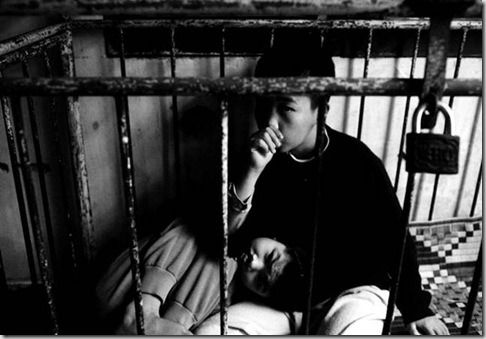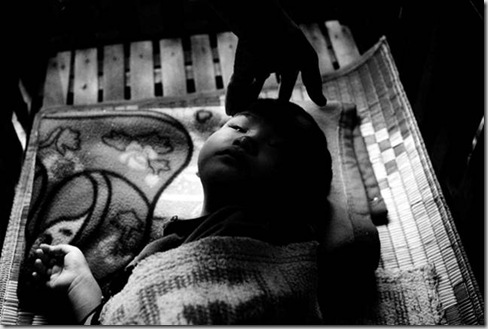Essere orfani in Vietnam
Every once in while I'll have people ask me about working on personal projects dealing with social issues. The common question from beginner photojournalists and from people interested in the work is "how do these stories or photos help?". It's a valid question. Covering sensitive issues requires a strangers presence in intimate situations. I'm not writing this to justify what I do, I am very comfortable with that. I am writing this for beginner photographers who might question themselves at times as they begin their careers and search for that first story. I'm not a seasoned veteran at all, in fact I'm a fairly new full time professional but I do receive quite a few emails on this topic so I wanted to share my experiences so far. One more thing, I'm in no way saying beginner photojournalists need to cover the hard hitting social issues, do what is dear to your heart. If these type of stories are important to you perhaps this blog will be of interest to you.
After completing a story about a Vietnam orphanage for disabled children living in horribly primitive living conditions I was left asking the same question, how will this help. My storytelling partner and producer Laura Lo Forti and I worked hard on this story and it took a long time to find a publication to put it out there. During the months of waiting without any response we both started to feel like we would never find a publication. Laura and I kept our spirits high but of course we we're feeling a bit discouraged. Newsweek finally published the story in late 2007 and the response was inspiring. Here is the finished story on Newsweek(along with comments) with a link to the local NGO that works directly with the orphanage.
http://www.newsweek.com/id/72882
Here are a few quotes I pulled from emails I received after the story was published:
"My name is (I LEFT IT OUT ON PURPOSE) and I am currently a student from San Francisco State University. My cousin emailed me the link to NEWSWEEK which features your work on the Vietnamese Orphanage in Hanoi. Do you have the contact information of that Orphanage? I would like to start a fund raiser of some sort and donate clothes if possible for the kids. People dont understand that anybody can make a difference and its not time consuming its worth the time consumed. Please get back to me as soon as you can."
"Justin, I am moved by your pics of this orphanage and would like to donate some money. I am wondering who the money goes to and if it is handled properly. I am hoping all the money goes straight to these handicapped and /or disabled children. Can you fill me in on how donations are handled? Has any of the money in the past been mishandled? How much of it goes to overhead or administration, etc? I would be grateful for any information you can provide."
"It is a shame to say that I, myself, a Vietnamese girl knew nothing about the victims of Agent Orange or that such tragic event had taken place. Affer watching your documentary about the children at Ba-Vi, I am proud say that because of your work, I am taking my own steps to help those kids. All in all, I wanted to say cam on. "
This was a wonderful reminder that this world is filled with fabulous people with compassionate hearts and they are willing to help in one way or another. One woman even had all her wedding attendees donate money to the orphanage instead of giving her wedding gifts. People surprised me and I'm humbled by their generosity. Many of the emails came from Newsweek but quite a few came from different NGO's that used the images on their website with my permission. Drawing attention on the NGO websites can be just as fruitful because many of their viewers are already concerned about a specific cause.
I realize not all these stories go in major publications like Newsweek and I have plenty of stories that have never seen publications. Just because your story wasn't published in a major media outlet doesn't mean it can't be for a good cause or have an impact. I want to talk about some unconventional ways I've personally seen photos have a positive impact.
The last image in this blog has never been published, neither has the story. The image was taken in the tuberculosis ward of a hospital in Siem Reap, Cambodia. I shared the image with an MSF(Doctors Without Borders) Dr in the neighboring run IDC(Infectious Disease Clinic), sorry about all the acronyms. He worked no more than 100 meters from the ward and had never seen this man. He was taken back by the images and asked me some questions immediately about the mans treatment for TB. He was extremely concerned that the emaciated man wasn't putting on weight after being on TB meds for so long. Long story short he sent a nurse over with me the next morning to the Cambodian run ward and had him tested for HIV. He tested positive and the nurse had him on new meds and a nutrition program right away. He was under MSF care that day and that nurse and the Dr saved that mans life. He had lost half of his body weight and in a few months MSF had him close to his normal weight. He went from not leaving his bed for 3 months back to living in his home village.
In addition to the story above I have used that photo and the photos from the TB Ward in places that I would've never imagined. I was contacted by a Dr at UCLA Institute for Genomics and Proteomics. He asked to use my photo in a seminar on his research and I agreed. I've had various NGO's contact me to use my images for wonderful causes and I even a woman in Florida ask to use my images for a local auction to help raise money for a leprosy village in southern Vietnam.
The point is you just never know who is looking at your photos and what impact your story will have. The online community is huge and the more active you are in getting your work out their the more it will be seen. I recommend being up front with the people you are photographing about the possibilities of where the photos might end up. If they do agree handle the story with grace and remember the privilege they've granted you to be a witness to their life. If you have a positive outcome down the road that came from the story you shot don't forget to pass that story on to your subjects and let them know how they've helped.
Whatever level of involvement you want to take in your stories is up to you but go do that story and let people out there amaze you. I would like to conclude by thanking all the people who have graciously let me into their lives and thank you for reading this whoever you are.
Justin







Nessun commento:
Posta un commento